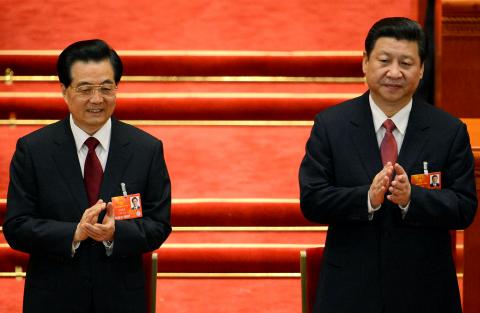China’s National People’s Congress yesterday formally elected Xi Jinping (習近平) president, completing the nation’s second orderly political succession since the Communist Party took power in 1949.
The largely rubber-stamp congress chose Xi in a tightly scripted ceremony at the Great Hall of the People in Beijing, putting the final seal of approval on a generational transition of power.
Xi was appointed party and military chief — where real power lies — in November last year.

Photo: AFP
The 59-year-old was also elected head of the Central Military Commission, a parallel government post to the party’s top military position which he already holds, ensuring that he has full power over the party, state and armed forces. There was virtually no opposition among the carefully selected representatives to Xi becoming president. Xi drew just one no vote and three abstentions from the almost 3,000 delegates.
Xi bowed deeply and shook hands with his predecessor, Hu Jintao (胡錦濤), upon the announcement of the result, carried live on state television. Xi and Hu exchanged a few inaudible words.
Li Yuanchao (李源潮) was also elected vice president.
Vice Premier Li Keqiang (李克強) is set to succeed Premier Wen Jiabao (溫家寶) in a similarly scripted vote today.
Hu, 70, relinquished the presidency after serving the maximum two five-year terms.
Since taking up the much more powerful post of party chief in November last year, Xi has focused on fighting corruption and promoting austere practices such as banning senior military officers from holding alcohol-fueled banquets.
Many Chinese hope Xi will bring change in a country that has risen to become the world’s second-biggest economy, but is marred by deepening income inequality, corruption and environmental destruction left over from the administration of Hu and Wen.
For Yan Chengzhong, a delegate to the legislature, the most pressing task for Xi’s government is to clean up the environment.
“I come from Shanghai, where there are 6,000 dead pigs floating in the river. It speaks to how fragile the ecological environment is,” said Yan, who said he had submitted a proposal to the legislature urging government transparency on the environment.
Meanwhile, Gong Funeng, a delegate from Sichuan Province, said: “The most challenging problem that the government faces now is on implementing political reform and fighting corruption.”

The CIA has a message for Chinese government officials worried about their place in Chinese President Xi Jinping’s (習近平) government: Come work with us. The agency released two Mandarin-language videos on social media on Thursday inviting disgruntled officials to contact the CIA. The recruitment videos posted on YouTube and X racked up more than 5 million views combined in their first day. The outreach comes as CIA Director John Ratcliffe has vowed to boost the agency’s use of intelligence from human sources and its focus on China, which has recently targeted US officials with its own espionage operations. The videos are “aimed at

STEADFAST FRIEND: The bills encourage increased Taiwan-US engagement and address China’s distortion of UN Resolution 2758 to isolate Taiwan internationally The Presidential Office yesterday thanked the US House of Representatives for unanimously passing two Taiwan-related bills highlighting its solid support for Taiwan’s democracy and global participation, and for deepening bilateral relations. One of the bills, the Taiwan Assurance Implementation Act, requires the US Department of State to periodically review its guidelines for engagement with Taiwan, and report to the US Congress on the guidelines and plans to lift self-imposed limitations on US-Taiwan engagement. The other bill is the Taiwan International Solidarity Act, which clarifies that UN Resolution 2758 does not address the issue of the representation of Taiwan or its people in

DEFENDING DEMOCRACY: Taiwan shares the same values as those that fought in WWII, and nations must unite to halt the expansion of a new authoritarian bloc, Lai said The government yesterday held a commemoration ceremony for Victory in Europe (V-E) Day, joining the rest of the world for the first time to mark the anniversary of the end of World War II in Europe. Taiwan honoring V-E Day signifies “our growing connections with the international community,” President William Lai (賴清德) said at a reception in Taipei on the 80th anniversary of V-E Day. One of the major lessons of World War II is that “authoritarianism and aggression lead only to slaughter, tragedy and greater inequality,” Lai said. Even more importantly, the war also taught people that “those who cherish peace cannot

US Indo-Pacific Commander Admiral Samuel Paparo on Friday expressed concern over the rate at which China is diversifying its military exercises, the Financial Times (FT) reported on Saturday. “The rates of change on the depth and breadth of their exercises is the one non-linear effect that I’ve seen in the last year that wakes me up at night or keeps me up at night,” Paparo was quoted by FT as saying while attending the annual Sedona Forum at the McCain Institute in Arizona. Paparo also expressed concern over the speed with which China was expanding its military. While the US